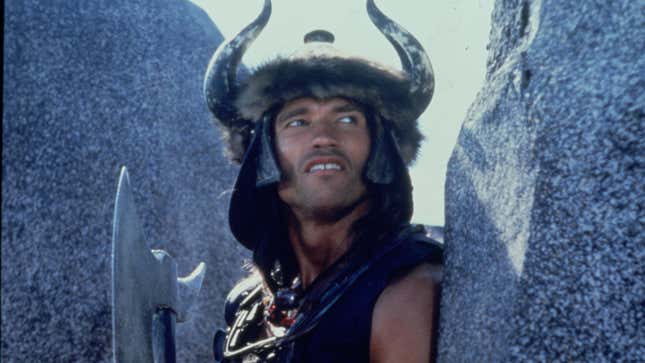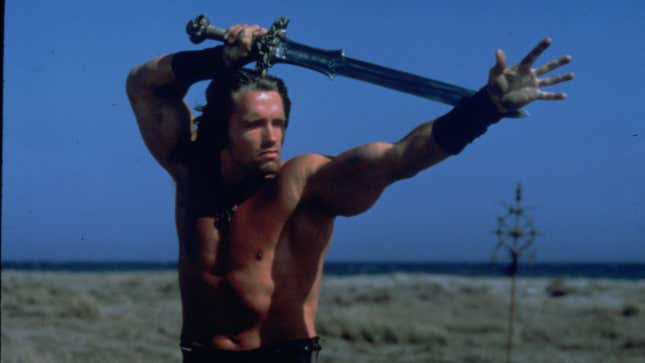
“That which does not kill us makes us stronger” is such an overworked cliché at this point that calling it trite would be understatement. So to watch Conan The Barbarian now, 40 years after its release on May 14, 1982, and to see those words emblazoned across the screen in bold text—with their correct attribution to Friedrich Nietzche—well, it’s understandable if laughter is the reaction. But director John Milius isn’t kidding.
A more complicated philosopher than often depicted, and coiner of the concept of the superman, Nietzsche is a favorite philosopher among libertarians and others who believe might makes right. Due to his sister’s selective publishings after his death, Nietzsche has been associated with fascism, though he also voiced opposition to nationalism and organized religion. The appeal to Milius was clear: One of the writer-director’s defining characteristics as a writer, by his own account, was being rejected from the U.S. Marine Corps on medical grounds. Like Conan creator Robert E. Howard, he wrote about warriors because he was not one, but longed to be. It’s no stretch to imagine Col. Kurtz’s monologue in Apocalypse Now, about the ideal soldier being both a loving family man and an emotionless killer, to be an embodiment of screenwriter Milius’ own daydreams, or even unfulfilled ambitions.
Likewise, when Conan speaks his first words onscreen—“To crush your enemies! Drive them before you! And to hear the lamentations of their women!”—the moment everyone hears that, they want to be Conan, at least according to Milius’ commentary on the film’s Blu-ray version. Again, he’s not kidding. And indeed, in the penultimate scene of the movie, Conan does all three of the things he said he would. Everyone with an Arnold Schwarzenegger impersonation (which is pretty much everyone) does that line now, usually with the ironic quality that came to define the actor in later years. But he was a relatively unknown quantity at the time; a charismatic bodybuilder cast for his looks. And he said it with the straightest face he’s ever given.

In 1982, critics called out those perceived fascist undertones in the film. In an otherwise positive review, Roger Ebert described the climax of the movie thusly: “I found myself thinking that Leni Reifenstahl [sic] could have directed the scene, and that Goebbels might have applauded it.” He added thereafter, “Am I being too sensitive? Perhaps. But when Conan appeared in the pulps of the 1930s, the character suggested in certain unstated ways the same sort of Nordic super-race myths that were being peddled in Germany.” Today, Arnold’s Conan seems downright noble and charitable compared to the fascist daydreams and eliminationist rhetoric we hear pouring out of the cybernetic fever swamps. At least the people he kills are genocidal cultists and actual cannibals.
The big-screen version of Conan came about in the wake of Star Wars, which cannily married sci-fi with sword and sorcery, via lightsabers and the Force. It was a combination many tried to duplicate: George Lucas’ most direct inspiration, Flash Gordon, returned as a live-action movie and Filmation cartoon. Hanna Barbera created Thundarr The Barbarian, set on a post-apocalypse Earth. Filmation’s Blackstar cartoon combined elements of Buck Rogers and J.R.R. Tolkien, a formula they’d refine to greater success when called upon to create a series based on Mattel’s new Masters of the Universe toys. (Contrary to urban legends, Masters of the Universe were developed independently of Conan, though Mattel briefly considered a Conan toy line as well.)
But not everyone could afford the special effects of Star Wars. The Beastmaster, originally based on a science-fiction novel, dropped all the sci-fi references to create an exclusively barbarian tale (The novel’s author, Andre Norton, had her name removed from the film adaptation). Conan’s original script, by Oliver Stone, was set in a post-apocalypse world and deemed prohibitively expensive. With Milius aboard, the story changed completely to one representing his own obsessions, including Japanese cinema, Viking mythology, the history of Genghis Khan, and bits and pieces of several of the original Howard stories. Kids expecting the Marvel Comics version were presented with something that undoubtedly made some parents cover their eyes.

But it’s that solid commitment to Milius’ social Darwinist, anarcho-libertarian worldview and the objectification of both men and women that has made Conan The Barbarian a movie that prevails, long after the likes of Ator and Deathstalker faded from the conversation. Milius cast his leads purely for physicality: besides Schwarzenegger, who actually had to drop some muscle mass to perform all the stunts, professional surfer Gerry Lopez played Conan’s friend Subotai, dancer Sandahl Bergman his lover Valeria, with bodybuilder Sven Ole-Thorsen and football player Ben Davidson as the two primary evil henchmen.
Conan’s dialogue was kept to a minimum, save many now-familiar Arnold “Auughhh!” grunts; Lopez was completely overdubbed in the final cut. These were ancient warriors cast to look like oversized pieces of fascist architecture, not Shakespeareans. And unlike in so many similar films, the director understood that concept, keeping their battles on the field of combat rather than with their own tongues.
Balancing out the heroes’ untested thespian skills, James Earl Jones, Max von Sydow, and Mako were cast in key roles to add gravitas whenever exposition was required. Jones and von Sydow had recently been Darth Vader and Ming the Merciless, respectively, so their credentials for the genre were impeccable. And a good thing, too—not everyone could pull off Jones’ monologue about the differences between steel and the flesh. It’s ridiculous on one level, yet deadly earnest in intent. And it’s that kind of self-seriousness that distinguishes this Conan film from its two follow-ups. Schwarzenegger’s sequel, Conan The Destroyer, played things campier under the less distinctive direction of Richard Fleischer, while 2011's Jason Momoa vehicle focused mainly on imagery serving a forgettable story. Neither of them really meant it the way Milius did.
Yet when people tout Conan The Barbarian as a classic now, they aren’t necessarily responding to any of the ideology, as much as the commitment to character and tone. In the intervening years, filmmakers as ideologically different from Milius as the Wachowskis have talked about making a King Conan film as a belated sequel. Schwarzenegger would go on to embrace a pointedly tongue-in-cheek persona onscreen, one that fans often mentally retrofit over his earlier, more serious roles. It makes Conan easier to appreciate semi-ironically—of course, we, the virtuous viewers, would never aspire to hear our enemies’ women lament, but how cool is it to see Conan do it in a fantasy setting? With that signature accent, forever associated with pithy putdowns? Many a liberal pacifist who acknowledges how complicated solutions can be in real life can enjoy a simplistic good vs. evil brawl in fiction.
To draw from a more recent, similarly misunderstood film, it’s like Fight Club in reverse. Author Chuck Palahniuk and director David Fincher made a movie specifically about selling macho self-mythology to gullible, impotent men as a hypocritical power fantasy. Not shockingly, a significant proportion of fans took it literally and missed the satire completely. John Milius, however, made the sort of movie Tyler Durden would sincerely love, selling that same power fantasy to folks he thought were like-minded. Instead, 40 years on, the movie’s exaggerated politics feel like satire, allowing us to appreciate the sex and violence as a heightened opera, or extreme pro-wrestling.
Crom, Conan’s Cimmerian deity who only likes to watch, would undoubtedly approve.